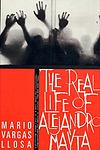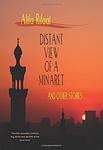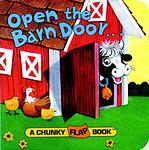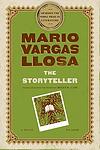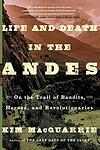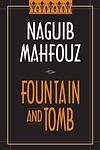The Greatest Peruvian, Egyptian "Fiction" Books Since 1950
Click to learn how this list is calculated.
This list represents a comprehensive and trusted collection of the greatest books. Developed through a specialized algorithm, it brings together 300 'best of' book lists to form a definitive guide to the world's most acclaimed books. For those interested in how these books are chosen, additional details can be found on the rankings page.
Genres
Countries
Date Range
Reading Statistics
Click the button below to see how many of these books you've read!
Download
If you're interested in downloading this list as a CSV file for use in a spreadsheet application, you can easily do so by clicking the button below. Please note that to ensure a manageable file size and faster download, the CSV will include details for only the first 500 books.
Download-
1. Woman at Point Zero by Nawal El Saadawi
"Woman at Point Zero" is a powerful novel about a woman named Firdaus who, after a life filled with hardships and abuse, finds herself on death row in an Egyptian prison. The narrative explores her life story, from her childhood of poverty and genital mutilation to her experiences with domestic violence, prostitution, and finally murder. Through her journey, the book offers a profound critique of patriarchal society and the systemic oppression of women.
-
2. The War of the End of the World by Mario Vargas Llosa
The book is a historical novel that recounts the War of Canudos, a conflict in late 19th-century Brazil over religious fanaticism, political instability, and social inequality. The story is centered around an apocalyptic movement led by a charismatic, messianic figure who convinces the poor and downtrodden to rise up against the Brazilian government, leading to a brutal and bloody conflict. The book explores themes of faith, power, poverty, and the destructive potential of fervent belief.
-
3. Children of Gebelawi by Naguib Mahfouz
"Children of Gebelawi" is a novel that allegorically presents the stories of Moses, Jesus, and Mohammed through the lives of characters in a Cairo neighborhood. The patriarch, Gebelawi, has five children, each representing a different prophet or religious figure, and their struggles mirror the religious and philosophical conflicts of the 20th century. The book explores themes of power, faith, and redemption, and it sparked controversy upon publication due to its portrayal of sacred figures.
-
4. Palace Walk by Naguib Mahfouz
The novel is set in Cairo during World War I and revolves around the life of a conservative Muslim family. The patriarch, a shopkeeper, has two wives and several children, and the story explores the dynamics within the family, particularly the tyrannical father's relationships with his wives and children. As the family navigates through a changing society, they encounter various challenges including political unrest, societal norms, and the struggle between tradition and modernity.
-
5. Conversation in the Cathedral by Mario Vargas Llosa
Set in mid-20th century Peru, "Conversation in the Cathedral" is a complex narrative that explores the corruption, decay, and turmoil of the society under the dictatorial rule of Manuel A. Odria. The story mainly revolves around two characters - a wealthy newspaper owner's son and his family's former chauffeur. Their chance meeting leads to a lengthy conversation that unravels the intricate web of political and personal corruption, disillusionment, and lost dreams in their lives and in their country. The novel is a profound examination of the power dynamics, societal decay, and the human condition in a politically oppressive environment.
-
6. The Feast of the Goat: A Novel by Mario Vargas Llosa
"The Feast of the Goat" is a historical novel set in the Dominican Republic during the rule of dictator Rafael Trujillo. It follows the story of Urania Cabral, a successful lawyer returning to her homeland after 30 years of self-imposed exile, and her struggle to confront the traumatic past that led to her departure. The narrative alternates between Urania's personal story and the brutal regime of Trujillo, providing a stark depiction of political tyranny and its effects on individual lives.
-
7. The Time of the Hero by Mario Vargas Llosa
"The Time of the Hero" is a novel set in a military academy in Lima, Peru, where a group of cadets try to maintain their individuality and resist the dehumanizing military routine. The story revolves around a stolen exam paper, the ensuing investigation, and the brutal fallout. The novel explores themes of power, corruption, and the struggle for identity within a rigid and oppressive system, offering a critical look at the military institution and its effects on society.
-
8. Aunt Julia and the Scriptwriter by Mario Vargas Llosa
The novel is a semi-autobiographical tale of a young man in Peru who falls in love with his divorced aunt, Julia, while working at a radio station. Their scandalous romance unfolds amidst the backdrop of a chaotic radio station run by a brilliant but unstable Bolivian scriptwriter who churns out daily soap operas. The narrative alternates between the protagonist's real life and the melodramatic world created by the scriptwriter, blending reality and fiction in a humorous and poignant exploration of love and creativity.
-
9. The Cairo Trilogy by Naguib Mahfouz
"The Cairo Trilogy" is a captivating tale set in Egypt during the early 20th century, following the lives of the Abd al-Jawad family. The trilogy explores the intricacies of family dynamics, societal changes, and political unrest, as it delves into the personal struggles and triumphs of its characters. With vivid descriptions and rich storytelling, the trilogy offers a deep insight into the complexities of Egyptian society, tradition, and modernization, making it a timeless masterpiece of literature.
-
10. Miramar by Naguib Mahfouz
Set in 1960s Egypt, "Miramar" tells the story of an aging revolutionary, a rich man's daughter, a corrupt journalist, and a real estate agent who all come to reside at the Miramar Pension in Alexandria. Their lives intertwine with the life of the young peasant woman who works there as a maid, and through their interactions, the novel explores themes of social and political change in Egypt, the struggle between old and new, and the power of the individual to shape their own destiny.
-
11. Deep Rivers by José María Arguedas
"Deep Rivers" is a novel that follows the life of a young boy who is caught between the Spanish and indigenous cultures of Peru. The protagonist is sent to a Catholic boarding school, where he experiences the harsh realities of social and racial divisions within the country. As he navigates these challenging circumstances, he develops a deep connection with the indigenous Andean culture and its spiritual relationship with nature. The novel is a profound exploration of identity, culture, and the struggle of indigenous peoples in a colonized society.
-
12. A World for Julius by Alfredo Bryce Echenique
"A World for Julius" follows the life of Julius, a young boy from a wealthy, aristocratic family in Peru. The novel is a biting social critique of the Peruvian upper classes, as seen through the eyes of Julius, who is often at odds with his family's values and lifestyle. The narrative explores themes of class, privilege, and the struggle for identity in a world dominated by wealth and social status.
-
13. Two Women In One by Nawal El Saadawi
The novel explores the internal and external struggles of a young Egyptian woman who aspires to be a dancer and artist, defying the traditional gender roles and societal expectations imposed upon her. As she pursues her passion, she faces oppression and resistance from a patriarchal society that seeks to control women's bodies and minds. The protagonist's journey is one of self-discovery and rebellion, as she battles to reconcile her desires with the harsh realities of her environment, ultimately striving to forge her own identity and find freedom within a repressive cultural landscape.
-
14. Zayni Barakat by Jamal al- Ghitani
"Zayni Barakat" is a captivating novel set in 19th-century Egypt, following the life of Zayni Barakat, a young man caught in the midst of political and societal turmoil. As he navigates through a world of corruption, power struggles, and forbidden love, Zayni's journey becomes a reflection of the struggles faced by the Egyptian people. Through vivid storytelling and rich historical context, the book explores themes of identity, revolution, and the complex dynamics of a nation on the brink of change.
-
15. The Real Life of Alejandro Mayta by Mario Vargas Llosa
This novel revolves around a failed Peruvian revolution and the man who attempted to lead it, Alejandro Mayta. The story is told from the perspective of a novelist who is researching Mayta's life and the events surrounding the failed uprising. The narrative oscillates between the present and the past, unraveling the complex threads of Mayta's personal history, political beliefs, and the broader socio-political context of Peru. The novel explores themes of truth, fiction, and the blurry lines between them.
-
16. Distant View Of A Minaret by Alifa Rifaat
The book is a collection of short stories that delve into the lives of women in contemporary Egyptian society, offering a poignant and often stark portrayal of the challenges they face. Through the lens of various female protagonists, the stories explore themes of sexuality, marriage, fidelity, and the role of women within the constraints of a patriarchal culture. The narratives often highlight the inner lives and suppressed desires of these women, revealing the gap between personal aspirations and societal expectations. The title story epitomizes the collection's essence, presenting a woman's reflection on her unfulfilling marriage and her yearning for spiritual and emotional fulfillment, symbolized by the distant view of a minaret.
-
17. The Open Door by Latifa Zayyat
The novel explores the journey of a young Egyptian woman during the 1940s and 1950s, a period of political turmoil and social change in Egypt. As she comes of age, the protagonist grapples with the constraints of traditional societal expectations and her desire for personal and intellectual freedom. Her story intertwines with the broader narrative of her country's struggle against British colonialism and the quest for national identity, reflecting the broader themes of liberation and self-determination. Through her experiences, the book delves into issues of gender, politics, and the quest for meaning in a rapidly changing world.
-
18. The Storyteller by Mario Vargas Llosa
"The Storyteller" is a novel that explores the tension between modern civilization and indigenous culture. The narrative alternates between two perspectives: one of a successful documentary filmmaker in Italy who is haunted by his past in Peru, and the other of an indigenous storyteller from an Amazonian tribe. The filmmaker recalls his college friend, who was fascinated by the indigenous cultures of Peru and disappeared into the Amazon rainforest. As the story unfolds, it becomes increasingly apparent that the indigenous storyteller and the filmmaker's lost friend are one and the same. This revelation leads to a profound examination of the effects of cultural assimilation, the value of tradition, and the power of storytelling.
-
19. The Map Of Love by Ahdaf Soueif
This novel intricately weaves together the lives of two women, separated by a century, who find themselves connected through a shared history and a mysterious collection of letters and journals. Set against the rich backdrop of late 19th and 20th-century Egypt, the story explores themes of love, politics, and the enduring impact of colonialism. As the modern-day protagonist delves into the past, she uncovers a passionate love affair between her ancestor, an Englishwoman, and an Egyptian nationalist. This discovery leads her on a journey of self-discovery and a deeper understanding of her cultural heritage, revealing the complexities of identity, the power of love, and the intricate map of human connections that transcends time and place.
-
20. Palace of Desire by Naguib Mahfouz
"Palace of Desire" is a novel set in Cairo in the 1920s, continuing the saga of the Cairene patriarch Al-Sayyid Ahmad and his family. It explores the dynamics of the family, the father's authoritarian rule, the sons' rebelliousness, and the daughters' submissiveness. The book also delves into the themes of love, lust, power, and the struggle between tradition and modernity in Egyptian society. The narrative is a blend of social realism and psychological insight, offering a vivid portrait of a society in transition.
-
21. Sugar Street by Naguib Mahfouz
"Sugar Street" is the final novel in a trilogy set in Cairo, Egypt, from the 1919 Egyptian Revolution through the end of World War II. It follows the lives of the al-Jawad family, focusing on the younger generation's political activism and romantic entanglements against the backdrop of a changing society. The book explores themes of modernization, colonialism, and the clash between tradition and progress.
-
22. Death In Andes by Mario Vargas Llosa
"Death in the Andes" is a haunting and atmospheric novel set in the remote Andean village of Naccos, where two soldiers are sent to investigate the mysterious disappearance of three men. As they delve deeper into the village's secrets, they uncover a dark history of violence, political turmoil, and superstition. Blending elements of mystery, political commentary, and magical realism, this gripping tale explores the complexities of human nature and the impact of Peru's turbulent past on its present.
-
23. Cleopatra: A Life by Stacy Schiff
"Cleopatra: A Life" by Stacy Schiff is a detailed biography of one of the most famous and enigmatic figures in history, Cleopatra VII of Egypt. The book explores her life from childhood to her reign as queen, her relationships with Julius Caesar and Mark Antony, and her eventual downfall. Schiff uses primary sources and historical records to paint a vivid picture of Cleopatra's world and dispel many of the myths surrounding her life. The book also delves into the political and cultural context of ancient Egypt and Rome, providing a fascinating glimpse into a bygone era.
-
24. Fountain And Tomb by Najib Mahfuz
"Fountain and Tomb" is a collection of interwoven short stories that paint a vivid portrait of life in a Cairo alley during the early 20th century. Through the eyes of a young narrator, the book delves into the daily lives, secrets, and communal relationships of the residents, offering a tapestry of human experiences that range from the humorous to the tragic. The narrative captures the essence of a changing society, where tradition clashes with modernity, and where characters grapple with issues of morality, love, and the inexorable passage of time. The work is a poignant reflection on the complexities of life within a tight-knit community, encapsulating the universal themes of change, memory, and the enduring human spirit.
-
25. The Bad Girl by Mario Vargas Llosa
The novel follows the life of Ricardo Somocurcio, a man from Lima, Peru, who becomes infatuated with a mysterious girl he meets in his youth. This girl, who constantly reinvents her identity, reappears throughout his life in various guises and names, leading him on a tumultuous and passionate journey that spans continents and decades. As Ricardo pursues a career as a translator and moves through different countries, he encounters the enigmatic woman in various circumstances, each time falling under her spell despite the pain and complexity she brings into his life. The story is a reflection on love, obsession, and the transformative power of relationships over time.
Reading Statistics
Click the button below to see how many of these books you've read!
Download
If you're interested in downloading this list as a CSV file for use in a spreadsheet application, you can easily do so by clicking the button below. Please note that to ensure a manageable file size and faster download, the CSV will include details for only the first 500 books.
Download












